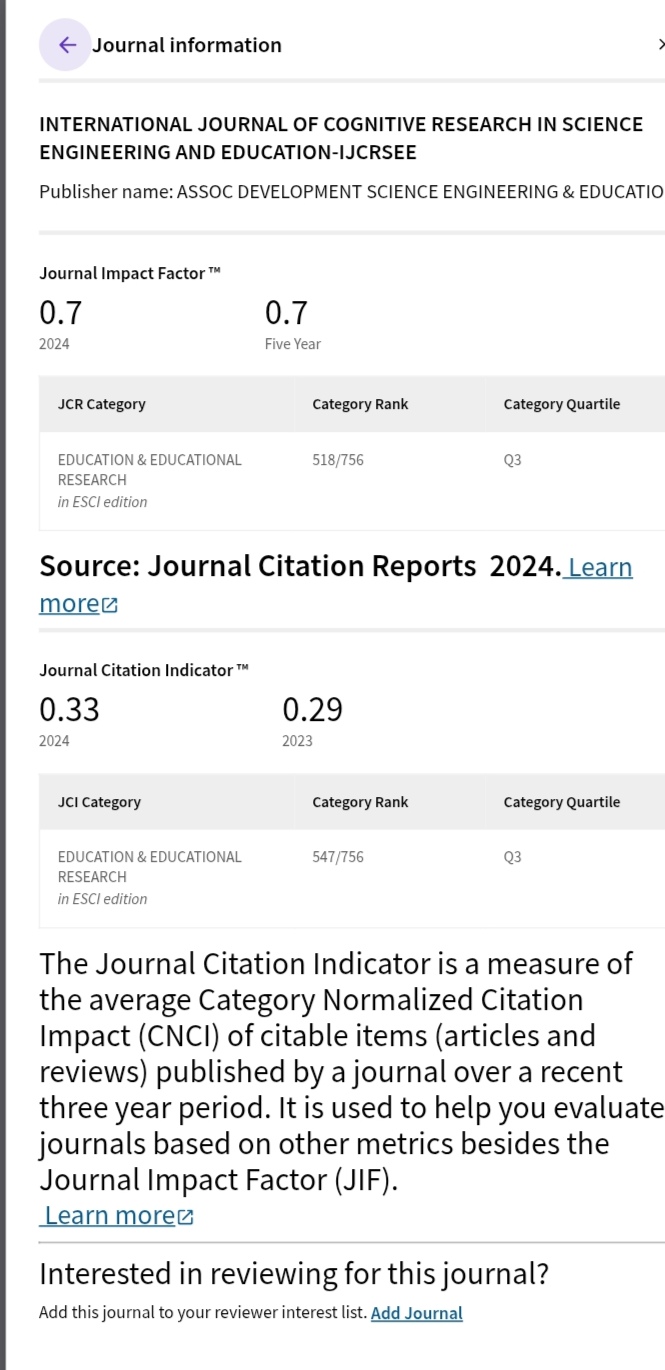Belief in Information Conspiracy and Personality Traits of Generations X and Y
DOI:
https://doi.org/10.23947/2334-8496-2022-10-3-83-88Keywords:
online teaching, English for Specific Purposes, computer-mediated learning, synchronous conferencing, synchronous online teaching, teaching methodsAbstract
The article presents the results of comparing the belief in information conspiracies in connection with personality traits among representatives of Generations Y and X, nationalities – the Russians and the Kumyks. We call information conspiracies those that are presented in the information space and are presented as close to reality. Therefore, users who get acquainted with information conspiracies do not doubt and believe in them. The sample was presented by the Russian university students and middle-aged working people. The questionnaire of conspiracy mentality (CMQ) (Bruder, Haffke) and the FPI technique (Farenberg, Zarg and Gampel) have been applied. It was revealed that the older the generation, the more it believes in the state conspiracy; generations have stable beliefs about the presence of a political conspiracy; the representatives of the Kumyk group are more prone to exaggeration of the importance of conspiracy than the group of the Russians generation Y; the personality trait “irritability” correlates with the scale of belief in public conspiracy; there was a negative dependence of emotional lability and belief in a political conspiracy. The results are compared with the data of foreign studies on the samples of representatives of the USA, Great Britain, Turkey, Germany. It was concluded that it is possible to observe cultural and intergenerational differences in expression of conspiracy mentality. Representatives of Generation Y believe more in political and public conspiracies. Representatives of Generation X believe more in public conspiracy and secret organizations.
Downloads
References
Almulla, M. (2018). Investigating teachers’ perceptions of their own practices to improve students’ critical thinking in secondary schools in Saudi Arabia. International Journal of Cognitive Research in Science, Engineering and Education (IJCRSEE), 6(3), 15–27. https://doi.org/10.5937/ijcrsee1803015A DOI: https://doi.org/10.5937/ijcrsee1803015A
Beemster, T., Bijleveld, N., & Treur, J. (2021). On Becoming a Conspiracy Thinker: A Second-Order Adaptive Network Model. Procedia Computer Science, 190, 51-63. https://doi.org/10.1016/j.procs.2021.06.007 DOI: https://doi.org/10.1016/j.procs.2021.06.007
Brotherton, R., French, C. C., & Pickering, A. D. (2013). Measuring belief in conspiracy theories: The generic conspiracist beliefs scale. Frontiers in psychology, 279. https://doi.org/10.3389/fpsyg.2013.00279 DOI: https://doi.org/10.1037/t41554-000
Bruder, M., Haffke, P., Neave, N., Nouripanah, N., & Imhoff, R. (2013). Measuring individual differences in generic beliefs in conspiracy theories across cultures: Conspiracy Mentality Questionnaire. Frontiers in psychology, 4, 225. https://doi.org/10.3389/fpsyg.2013.00225 DOI: https://doi.org/10.3389/fpsyg.2013.00225
Dyrendal, A., Kennair, L. E. O., & Bendixen, M. (2021). Predictors of belief in conspiracy theory: the role of individual differences in schizotypal traits, paranormal beliefs, social dominance orientation, right wing authoritarianism and conspiracy mentality. Personality and individual differences, 173, 110645. https://doi.org/10.1016/j.paid.2021.110645 DOI: https://doi.org/10.1016/j.paid.2021.110645
Entin, D. (2000). Теории заговора и конспирологический менталитет [Conspiracy theories and conspiratorial mentality]. Новая и новейшая история 1. Retrieved from http://vivovoco.astronet.ru/VV/PAPERS/ECCE/CONSP.HTM
Ermakov, P. N., & Belousova, E. (2021). The Relationship Between the Strategies of Transferring the Meanings of Information Messages and the Meaning-of-Life Orientations of Social Networks Users. International Journal of Cognitive Research in Science, Engineering and Education (IJCRSEE), 9(2), 279–289. https://doi.org/10.23947/2334-8496-2021-9-2-275-289 DOI: https://doi.org/10.23947/2334-8496-2021-9-2-275-289
Fahrenberg, J., Hampel, R. & Selg, H. (2001). Das Freiburger Persönlichkeitsinventar FPI. Revidierte Fassung FPI-R und teilweise geänderte Fassung FPI-A1 [The Freiburg Personality Inventory FPI. Revised version FPI-R and partially amended version FPI-A1]. Handanweisung 7 Auflage. Göttingen: Hogrefe. Retrieved from https://romania.testcentral.ro/media/fpir-f-en-BQIULF4D.pdf
Georgiou, N., Delfabbro, P., & Balzan, R. (2019). Conspiracy beliefs in the general population: The importance of psychopathology, cognitive style and educational attainment. Personality and Individual Differences, 151, 109521. https://doi.org/10.1016/j.paid.2019.109521 DOI: https://doi.org/10.1016/j.paid.2019.109521
Green, R., & Douglas, K. M. (2018). Anxious attachment and belief in conspiracy theories. Personality and Individual Differences, 125, 30-37. https://doi.org/10.1016/j.paid.2017.12.023 DOI: https://doi.org/10.1016/j.paid.2017.12.023
Hattersley, M., Brown, G. D., Michael, J., & Ludvig, E. A. (2022). Of tinfoil hats and thinking caps: Reasoning is more strongly related to implausible than plausible conspiracy beliefs. Cognition, 218, 104956. https://doi.org/10.1016/j.cognition.2021.104956 DOI: https://doi.org/10.1016/j.cognition.2021.104956
Kowalski, J., & Gawęda, Ł. (2021). Mediating role of metacognitive beliefs and cognitive-attentional syndrome in the relationship between persecutory and coronavirus conspiracy beliefs in a community sample. Schizophrenia Research, 237, 29-30. https://doi.org/10.1016/j.schres.2021.08.024 DOI: https://doi.org/10.1016/j.schres.2021.08.024
Lamberty, P. K., Hellmann, J. H., & Oeberst, A. (2018). The winner knew it all? Conspiracy beliefs and hindsight perspective after the 2016 US general election. Personality and Individual Differences, 123, 236-240. https://doi.org/10.1016/j.paid.2017.11.033 DOI: https://doi.org/10.1016/j.paid.2017.11.033
Leone, L., Giacomantonio, M., Williams, R., & Michetti, D. (2018). Avoidant attachment style and conspiracy ideation. Personality and Individual Differences, 134, 329-336. https://doi.org/10.1016/j.paid.2018.06.043 DOI: https://doi.org/10.1016/j.paid.2018.06.043
Moscovici, S. (1987). The conspiracy mentality. In Changing conceptions of conspiracy (pp. 151-169). Springer, New York, NY. https://doi.org/10.1007/978-1-4612-4618-3_9 DOI: https://doi.org/10.1007/978-1-4612-4618-3_9
Pishchik, V.I. (2017). Возможность измерения веры в заговоры [The ability to measure belief in a conspiracy]. European Social Science Journal, 1. 419-424. Retrieved from https://www.elibrary.ru/item.asp?id=29914436&
Ross, M. W., Essien, E. J., & Torres, I. (2006). Conspiracy beliefs about the origin of HIV/AIDS in four racial/ethnic groups. Journal of acquired immune deficiency syndromes (1999), 41(3), 342–344. https://doi.org/10.1097/01.qai.0000209897.59384.52 DOI: https://doi.org/10.1097/01.qai.0000209897.59384.52
Shapiro, G. K., Holding, A., Perez, S., Amsel, R., & Rosberger, Z. (2016). Validation of the vaccine conspiracy beliefs scale. Papillomavirus research, 2, 167-172. https://doi.org/10.1016/j.pvr.2016.09.001 DOI: https://doi.org/10.1016/j.pvr.2016.09.001
Ståhl, T., & Van Prooijen, J. W. (2018). Epistemic rationality: Skepticism toward unfounded beliefs requires sufficient cognitive ability and motivation to be rational. Personality and Individual Differences, 122, 155-163. https://doi.org/10.1016/j.paid.2017.10.026 DOI: https://doi.org/10.1016/j.paid.2017.10.026
Swami, V., Coles, R., Stieger, S., Pietschnig, J., Furnham, A., Rehim, S., & Voracek, M. (2011). Conspiracist ideation in Britain and Austria: Evidence of a monological belief system and associations between individual psychological differences and real-world and fictitious conspiracy theories. British Journal of Psychology, 102(3), 443-463. https://doi.org/10.1111/j.2044-8295.2010.02004.x DOI: https://doi.org/10.1111/j.2044-8295.2010.02004.x
van Der Tempel, J., & Alcock, J. E. (2015). Relationships between conspiracy mentality, hyperactive agency detection, and schizotypy: Supernatural forces at work?. Personality and Individual Differences, 82, 136-141. https://doi.org/10.1016/j.paid.2015.03.010 DOI: https://doi.org/10.1016/j.paid.2015.03.010
Wood, M. J., & Gray, D. (2019). Right-wing authoritarianism as a predictor of pro-establishment versus anti-establishment conspiracy theories. Personality and Individual Differences, 138, 163-166. https://doi.org/10.1016/j.paid.2018.09.036 DOI: https://doi.org/10.1016/j.paid.2018.09.036
Published
How to Cite
Issue
Section
Categories
License
Copyright (c) 2022 Vlada Pishchik

This work is licensed under a Creative Commons Attribution 4.0 International License.
Plaudit
Accepted 2022-11-07
Published 2022-12-20











